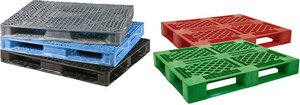A Deep Dive into the Plastic Pallet Industry in Malaysia
Body
The logistics and manufacturing industry in Malaysia, like many others worldwide, relies heavily on pallets for the transportation and storage of goods. Traditionally, wooden pallets dominated the market due to their affordability and availability. However, in recent years, plastic pallets have emerged as a preferred choice for Malaysian manufacturers. This shift is driven by several factors, including durability, hygiene, sustainability, and cost-efficiency in the long term.
Durability and Longevity
One of the most significant advantages of plastic pallets over wooden pallets is their durability. Plastic pallets are resistant to moisture, rot, and pests, which are common issues with wooden pallets in Malaysia’s humid climate. Additionally, plastic pallets do not splinter or break easily, making them ideal for heavy-duty and repeated use.
While wooden pallets may seem cost-effective initially, their shorter lifespan due to wear and tear often leads to higher replacement costs over time. Plastic pallets, on the other hand, can withstand harsh handling and extreme conditions, making them a more reliable option for long-term use.
Hygiene and Compliance
In industries like food, pharmaceuticals, and electronics, hygiene is a top priority. Plastic pallets offer a non-porous surface that is easy to clean and sanitize, ensuring that they meet stringent health and safety regulations. Wooden pallets, by contrast, can absorb liquids and harbor bacteria, mold, or pests, posing contamination risks.
With Malaysia’s growing focus on exports, particularly in sectors requiring high hygiene standards, plastic pallets have become a favored choice for manufacturers aiming to comply with international regulations such as ISPM-15, which governs the treatment of wooden pallets to prevent pest infestations.
Sustainability and Environmental Impact
Sustainability is a growing concern among Malaysian businesses, and plastic pallets align well with this trend. Many plastic pallets are made from recycled materials and are fully recyclable at the end of their lifespan. This circular economy approach minimizes waste and reduces environmental impact.
Wooden pallets, while biodegradable, contribute to deforestation and require significant energy for production and treatment. Moreover, their shorter lifespan often leads to frequent disposal, increasing their environmental footprint. By switching to plastic pallets, Malaysian manufacturers are adopting more eco-friendly practices that resonate with global sustainability goals.
Cost Efficiency
Although the upfront cost of plastic pallets is higher than that of wooden pallets, their long-term cost benefits make them a wise investment. Their durability reduces replacement and repair costs, while their lightweight nature lowers transportation expenses by reducing fuel consumption.
Plastic pallets are also stackable and uniform in size, optimizing storage space and improving efficiency in warehouse operations. Wooden pallets, with their irregularities and susceptibility to damage, often lead to inefficiencies and higher operational costs over time.
Customization and Versatility
Plastic pallets offer greater flexibility in terms of design and customization. Manufacturers can produce them in various sizes, colors, and designs to suit specific requirements, such as branding or specialized handling needs. Features like anti-slip surfaces, reinforced edges, and RFID tracking options enhance their functionality, making them a versatile solution for modern supply chains.
Wooden pallets, while customizable to some extent, lack the precision and advanced features that plastic pallets can provide. This limitation often makes them less adaptable to the evolving demands of Malaysian manufacturers.
Safety Considerations
Safety is a crucial factor in pallet selection, particularly in industries that handle heavy or hazardous materials. Plastic pallets eliminate risks associated with splinters, protruding nails, and structural weaknesses common in wooden pallets. Their consistent weight and structure also ensure stability during transportation, reducing the likelihood of accidents.
In Malaysia’s bustling manufacturing sector, where efficiency and safety are paramount, plastic pallets’ superior design and build quality contribute to a safer work environment for employees.
Industry-Specific Applications
Different industries have unique requirements that influence their choice of pallets. In Malaysia’s food and beverage industry, for example, the hygienic properties of plastic pallets make them indispensable. Similarly, the electronics sector benefits from plastic pallets’ ability to withstand static electricity, a feature not found in wooden pallets.
Even in industries where cost is a primary concern, the long-term savings and operational advantages of plastic pallets are becoming increasingly evident. Their versatility across various applications is a key reason why Malaysian manufacturers are making the switch.
Challenges and Limitations
Despite their many advantages, plastic pallets are not without challenges. Their higher initial cost can be a deterrent for small businesses with limited budgets. Additionally, repairing a damaged plastic pallet is often more complex and expensive than fixing a wooden one.
However, advancements in manufacturing technology are addressing these limitations. The increasing availability of cost-effective plastic pallets and improved repair options are making them accessible to a broader range of businesses in Malaysia.
The Future of Pallet Use in Malaysia
As Malaysia continues to develop as a regional manufacturing hub, the demand for efficient, sustainable, and reliable logistics solutions will only grow. Plastic pallets are well-positioned to meet these demands, offering a modern alternative to traditional wooden pallets.
Government initiatives promoting sustainable practices and the adoption of advanced technologies further support the shift towards plastic pallets. For instance, incentives for businesses that adopt eco-friendly solutions could accelerate this trend, making plastic pallets a staple in Malaysia’s manufacturing and logistics sectors.
Conclusion
The transition from wooden pallets to plastic pallets among Malaysian manufacturers is a testament to the evolving priorities of the industry. Durability, hygiene, sustainability, cost efficiency, and safety are key factors driving this shift, reflecting a broader commitment to modernizing supply chain practices.
While challenges remain, the long-term benefits of plastic pallets far outweigh their drawbacks, making them an increasingly popular choice. As Malaysia’s manufacturing sector continues to grow and innovate, plastic pallets are set to play a pivotal role in shaping its logistics landscape.










Comments